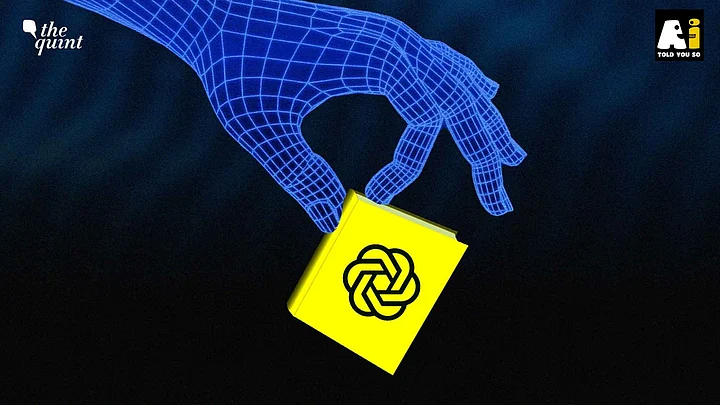It goes against the decree of conventional wisdom to imagine Shakespeare as an unsuccessful writer.
Had he been a writer in this day, where digital demons loom over the elation of creative expression, an uncelebrated Shakespeare seems less bizarre a thought and more rational a possibility. When we set to employ technology to solve contemporary predicaments, we intended to automate the mundane.
However, poetry and painting fall far from mundanity. Art, literature and filmmaking are the embodiments of emotions and experiences.
And the assertion that a machine parasitising our creative properties may defenestrate people of art — dissolves a bone in my body.
We have oftentimes seen quirky algorithmic takeovers as a recurring theme in literature. Seeing this notion seep from fiction to reality is certainly not a merry transition to witness. While many argue this is a metamorphosis of the literary realm, I see it as its annihilation.
This article is a part of 'AI Told You So', a special series by The Quint that explores how Artificial Intelligence is changing our present and how it stands to shape our future. Click here to view the full collection of stories in the series.
AI Writes a Novel - An Unsolicited Pursuit
A few years back, the thought of a machine writing novels would make me chuckle — perhaps out of a writer's old treasured vanity — but not anymore.
Earlier this May, Death of an Author: A Novella was published as arguably the first 'halfway readable' novel generated by AI. The novel's Goodreads page barefacedly mentions ChatGPT as one of its authors.
This GPT-authored novel has sparked conjecture regarding its alleged derivation from various authors, including Agatha Christie. Although the novel is no masterpiece taking readers by storm, it sure is a moral concern.
The point of reading is to enter someone else's stream of consciousness and gain perspicacity into their thought and intellect. An algorithm churning words defies this very notion.
The process of creation is deep and personal, and one has never invited machine intervention in it. Literature and art must stem from an urge to convey something urgent and profound.
Every work of literature has a sentimental and social value attached to it. They translate internal emotions into something external and concrete. And emotions cannot be fabricated. Blindly manufactured AI art is a flower that blooms in the morning and wilts by dusk.
Creative professionals have never seen their work with hostility but have considered it with rather teeming sacredness. Automation in the literary arena is an unsolicited and futile quest. Capability does not unequivocally translate to compulsion — just because one can now robotise creativity does not mean one ought to.
Copyrights - A Battle of Belonging
As more and more work curated using generative AI proliferates — the question of ownership becomes a matter of copious discussion. Two major questions arise at this juncture. Who owns the copyright to an AI-generated piece? And does it infringe the copyrights of other authors
Copyright usually belongs to the creator of an original work.
When an AI is prompted to generate any form of art, four abled candidates can compete for the copyrights — the user who prompts the AI tool, the engineers who build the AI tools, the AI tool itself or the multitude of whose bodies of work were fed as prey to the beast of AI. This battle of copyrights is an uncharted avenue with no precedent to follow.
However, the fundamental of AI-generated writing is the works of an enormous number of human authors provided to it as 'training data'.
Thus, originality becomes a concern. AI writing can be seen as a high level of plagiarism which cannot be regarded as 'literary material'. Every writer has an idiosyncratic style, tone and voice. An AI cannot get away by merely smashing, blending and parroting the voices of others.
AI has made copyrights and their infringement a subjective and sensitive dimension — thereby calling for the establishment of an ecosystem where clear borders define the ownership of materials used for and produced by AI while safeguarding popular morality.
I think, therefore, I am. But if we lend our emancipation of thought to machines, we might not be the ones required to think at all. Creativity is the sceptre of the human mind that immunes us from the paralysis of imagination.
As we let the luring venom of machine automation inflict upon our artistic liberty, we are bound to descend into times where our participation in essential activities would cease.
Hell is empty and all the devils are here. And the devils of AI are here to stay — for someone's nightmares are someone else's dreams.
The ghosts of AI have rendered writers of the world in absolute fright. But fright is not a helpful sentiment here. We must galvanise our wits to decide what future we need to hold for ourselves and what we are ready to surrender.
While we engage in the bargain of our tomorrow, I shall drown myself in my current read — Cursed Bunny, which to some respite, is written and translated by two humans.
(Suvrat Arora is a graduate from Thapar Institute of Engineering and Technology with a specialization in Conversational AI. He can be reached at suvratarora06@gmail.com. This is an opinion article and the views expressed above are the author’s own. The Quint neither endorses nor is responsible for them.)
